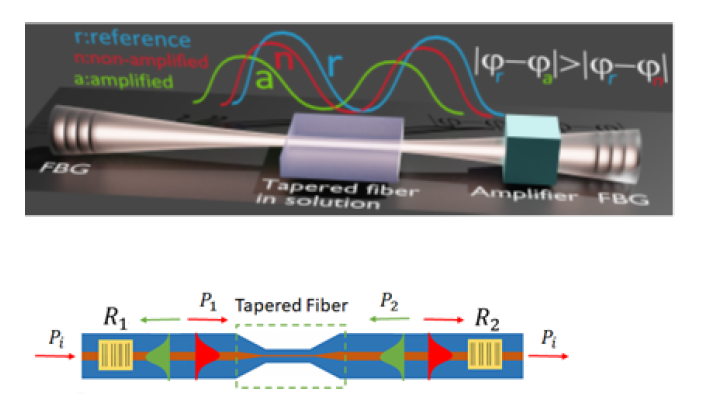

Novel Single and Multicavity Optical Fiber Systems for Sensing Applications
This thesis explores several aspects of fiber cavity optical sensors with tapered fibers as sensing heads. Firstly, we explore tapered fiber's thermal response in optical sensors to estimate thermally induced uncertainties in measurements theoretically. We derive an analytical expression that describes the temporospatial thermal response of the tapered fiber under the assumption of fundamental mode excitation and Gaussian heat source across the tapered fiber cross-sectional area. Secondly, we employ finite element method simulations to determine an optimum radius of tapered fiber in an active fiber cavity to maximize the sensor sensitivity. Thirdly, we propose a unique experimental configuration for conducting cavity ring down spectroscopy in an active fiber linear cavity sensing setup. Compared to previous approaches, our sensing modality allows the light to transverse the tapered fiber twice in one round trip, enhancing the sensor's sensitivity. Fourth and lastly, we propose a multi-cavity digital system based on the Vernier effect that carefully selects cavity lengths to predictably control sensor sensitivity, detection limit, and dynamic range of the sensor.
Significantly, all theoretical formulations and experimental schemes presented in this thesis are adaptable for integrated waveguide structures. Moreover, the temporospatial thermal model applies to optical sensing modalities that use tapered fibers as sensing heads. Furthermore, the current work is relevant for both liquid and gaseous phase sensing applications. We believe that the present thesis of novel single and multicavity optical fiber systems will find many sensing applications in chemical analysis, environmental monitoring, and biosensing.
Publications (J- Journals, C- Conferences):
[J1] U. Ullah, M. Yasin, A. Kiraz, and M. I. Cheema, “Digital sensor based on multicavity fiber interferometers”, JOSA B 36, no.9 2587–2592 (2019).
[J2] R. M. A. Ayaz, Y. Uysalli, B. Morova, N. Bavili, U. Ullah, M.D. Ghauri, M. I. Cheema, and A. Kiraz, “Linear cavity tapered fiber sensor using mode-tracking phase-shift cavity ring-down spectroscopy”, JOSA B 37, no.6 1707–1713 (2020).
[J3] M. D. Ghauri, S. Z. Hassain, U. Ullah, R. M. A. Ayaz, R. S. Z. Saleem, A. Kiraz, and M. I. Cheema “Detection of Aflatoxin M1 by Fiber Cavity Attenuated Phase Shift Spectroscopy”, Opt. Express 29, no.3 3873-3881 (2021).
[J4]U. Ullah and M. I. Cheema, “Temporospatial thermal analysis of tapered fibers in optical cavity sensing applications” (submitted)
[J5] U. Ullah and M. I. Cheema, “Phase shift-cavity ring down spectroscopy in linear and active fiber cavities for sensing applications at 1550 nm”(submitted).
[C1] U. Ullah and M. I. Cheema, “Fabry-Perot etalon with three fiber Bragg gratings as a digital sensor”, SPIE Photonics West, USA 2020.
[C2] M. I. Cheema, U. Ullah, M. D. Ghauri, R. M. A. Ayaz, Y. Uysalli, B. Morova, and A. Kiraz, “Amplified phase shift–fiber cavity ring down spectroscopy for biosensing applications at 1550nm”, SPIE, Photonics West, USA 2020.
[C3] U. Ullah, M. M. Haider, M. D. Ghauri, F. Sher, and M. I. Cheema, “Fluoride Detection in Drinking Water using Evanescent Fiber Cavity Ring-Down Spectroscopy”, SPIE Photonics West, USA, March 2021 (Accepted).

